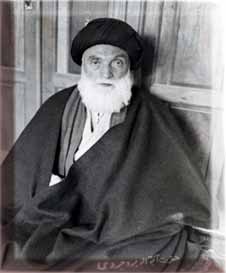- Seyyed Hossein Borujerdi
Infobox_Muslim scholars | notability = Muslim jurist| era =
modern era | color = #cef2e0 | | image_caption =
| image_caption =
image_size = |
| name = Seyyed Hossein Borujerdi | title= معظم له
birth = 1875 | death = Death date and age|1961|3|30|1875|1|1 | Maddhab =Twelver Shia Islam| school tradition=
Ethnicity =
Region =Iran andIraq | main_interests =Fiqh | notable idea =
works =
influences = | influenced =Morteza Motahhari
Grand Ayatollah Seyyed Hossein Borujerdi (1875-1961) (Persian: آیت الله العظمی سید حسین بروجردی) was aTwelver Shi'a Marja and the leading Marja in Iran from roughly 1947 to his death in 1961. [Mottahedeh, Roy, "The Mantle of the Prophet : Religion and Politics in Iran", One World, Oxford, 1985, 2000, p.231 ]Education and academic specialties
Borujerdi was born in the city of
Borujerd in the province of Lorestan inIran , hence the surname.In his youth, Borujerdi studied under a number of Shi'ite masters of
Islamic jurisprudence such asMohammad-Kazem Khorasani andAqa Zia Iraqi , and specialized in "fiqh ". He studied the "fiqahat" of all the Islamic schools of thought, not just his own, along with the science of "rijal ". Though he is known for citing "masoomeen " to support many of his deductions, Borujerdi is known for elucidating many aspects himself and is an influential "fiqh" jurist in his own right. He has had a strong influence on Islamic scholars likeMorteza Motahhari and Ayatollah Shaikh Husain Montazeri.Tenure as Ayatollah and Marja
Borujerdi revived the
hawza ofQom in 1945 (1364 AH), which had waned after the death in 1937 of its founder, Shaykh Abdul Karim Ha'iri. WhenSayyid Abul Hassan Isfahani died the following year, the majority of Shi'a accepted Ayatullah Borujerdi as Marja'-e-Taqlid. Scholar Roy Mottahedeh reports that Borujerdi was the sole marja "in the Shia world" from 1946-6 until his death in 1961. [Mottahedeh, "The Mantle of the Prophet", (1985, 2000), p.231 ]Efforts toward Islamic unity
Borujerdi was the first "Marja"' to look beyond
Iraq andIran . He sentSayyid Muhaqqiqi toHamburg ,Germany ,Aqa-e-Shari'at toKarachi ,Pakistan ,Al-Faqihi toMadinah and Sayyid Musa Sadr toLebanon .He established cordial relations with
Shaykh Mahmud Shaltut , the grand Shaykh ofAl-Azhar . Together, the two scholars established the "House for Bringing Muslim Sects Nearer " inCairo . Shaltut issued a famous "fatwa " accepting the Shi'a faith as one of the recognised sects of Islam.Political leanings
Unlike many clergy and temporal rulers, Borujerdi and Shah
Mohammad Reza Pahlavi , are said to have had cordial and mutually beneficial relations, starting with a visit by the not-yet-Shah to Borujerdi's hospital room in 1944. Borujerdi is said to have generally remained aloof from politics and given the Shah his "tacit support," while the Shah did not follow his father's harsh anti-clericalism (for example he exempted clergy from military service), and until Borujerdi's death occasionally visited the cleric. [Mottahedeh, "The Mantle of the Prophet", (1985, 2000), p.230 ]Borujerdi's belief in quietism, or separation of church from state, extended to keeping silent in public on such issues as
Israel 's treatment of the Palestinians, the overthrow ofMohammed Mossadeq and the end of his campaign to nationalize and control the British-owned oil industry in Iran, and the Baghdad Pact alliance with the US and UK. [Mottahedeh, "The Mantle of the Prophet", (1985, 2000), p.237-8] It is thought that as a reward for this support the Shah ensured more religious instruction in state schools, tightened control of cinemas and other offensive secular entertainment during Moharram.Ayatollah Borujerdi passively opposed the Pahlavi regime's agrarian reforms, which he called "agrarian destruction." [ [http://www.playandlearn.org/reader.asp?Type=Scholars&fn=114 Sayyid Husain Borujirdi] ] In his view, the confiscations of large concentrations of landholdings of aristocrats and clergy by the Pahlavi shahs disrupted the fabric of rural life and eroded religious institutions.
Future revolutionary
Ruhollah Khomeini was an underling of Borujerdi and Borujerdi forbade him to take part in political activities, a ban which only ended with Borujerdi's death.Death
Borujerdi died in
Qom onMarch 30 ,1961 . ["Bourjerdi dies in Iran,"The New York Times , March 31, 1961, p. 27.] The Shah proclaimed three days of mourning and attended a memorial service in his honor. [Mottahedeh, "The Mantle of the Prophet", (1985, 2000), p.240 ]ee also
*
Ruhollah Khomeini
*Marja
*List of Islamic studies scholars References
External links
* [http://www.playandlearn.org/reader.asp?Type=Scholars&fn=114 playandlearn.org Biography of Borujerdi]
Wikimedia Foundation. 2010.
